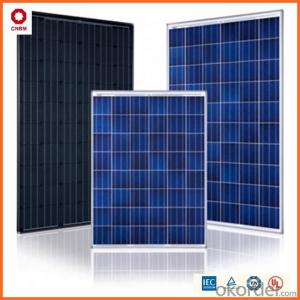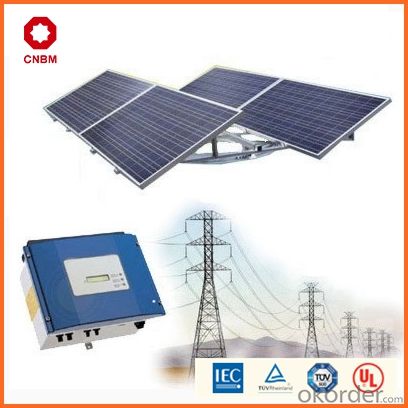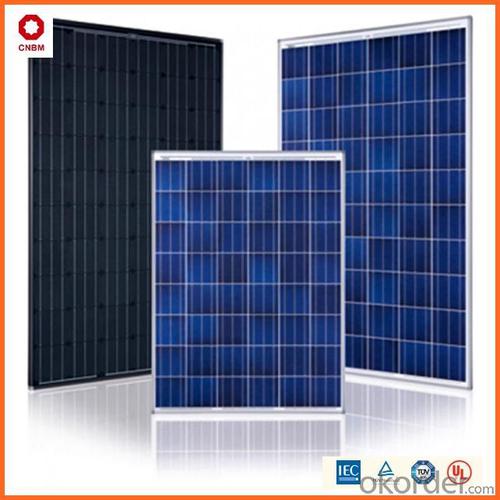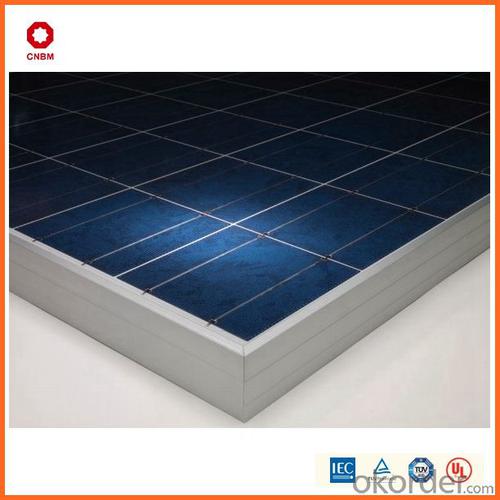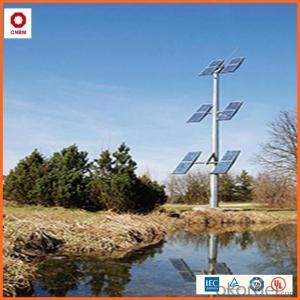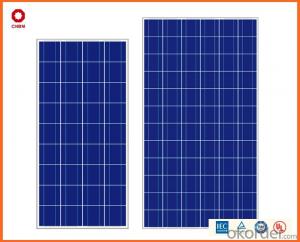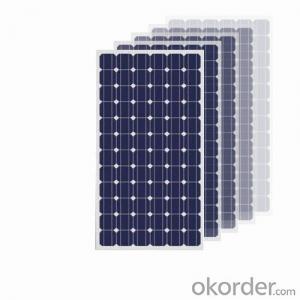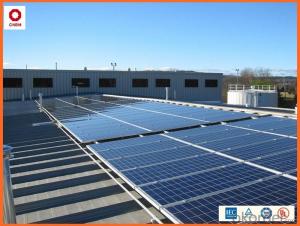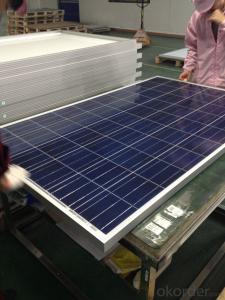Solair Solar Energy Systems - Small Solar Panel 55w Poly with Good Quality
- Loading Port:
- China main port
- Payment Terms:
- TT OR LC
- Min Order Qty:
- 1 watt
- Supply Capability:
- 10000000 watt/month
OKorder Service Pledge
OKorder Financial Service
You Might Also Like
Specification
Product Description:
Hot Sale !!! Quality and Safety of Small Poly Solar Panel 35~85w
1. Rigorous quality control meets the highest international standards.
2. High-transmissivity low-iron tempered glass, strong aluminium frame.
3. Using UV-resistant silicon.
4. IS09001/14001/CE/TUV/UL
Warranties of Small Poly Solar Panel 35~85w
1. 10 years limited product warranty
2. 15 years at 90% of the minimal rated power output
3. 25 years at 80% of the minimal rated power output
Specification
Characteristics of Poly solar panels CNBM (245-320W) | |||||
Max Power Voltage Vmp(V) | 30.3 | 30.8 | 31.1 | 31.4 | 31.85 |
Max Power Current Imp(A) | 7.60 | 7.64 | 7.73 | 7.81 | 7.85 |
Open Circuit Voltage Voc(V) | 36.1 | 36.6 | 37 | 37.3 | 37.68 |
Short Circuit Current Isc(A) | 8.50 | 8.55 | 8.65 | 8.75 | 8.85 |
Max Power Pm(W) | 230W | 235W | 240W | 245W | 250W |
Temperature Coefficient of Cells Poly solar panels CNBM (245-320W) | |
NOCT | 45± 2 |
Temperature Coeffucients of Isc | 0.0492 |
Temperature Coeffucients of Voc | -0.3374 |
Temperature Coeffucients of Voc | -0.4677 |
Mechanical Data of Poly solar panels CNBM (245-320W) | |
Dimension | 1638 × 982 × 40 mm |
Weight | 19.5 kg |
No. of Cells and Connections | 60 (6 ×10) |
Tolerance | 0 ~ + 5 W |
Cell | Monocrystalline Cell 156 × 156 mm |
Packing | 624 Pcs/40ft(H) Container |
Limits of Poly solar panels CNBM (245-320W) | |
Operating Temperature | -40 to +85 |
Storage Temperature | -40 to +85 |
Max System Voltage | 1000VDC(IEC) / 600VDC(UL) |
Features of our products:
• High conversion efficiency mono/poly-crystalline amorphous silicon solar cells
• Modules incorporate high performance bypass diodes to minimize the power drop caused by shading
• High transmittance, low-iron tempered glass
• High performance EVA encapsulant to prevent destroying and water.
• AI frame: without screw, corner connection. 8 holes on the frame can be installed easily
• Good performance of preventing from atrocious weather such as wind and hails
• Certifications: CE IEC TUV VDE UL, Class I
• 10 years 90% power output warranty

Shipping of Small Poly Solar Panel 35~85w
By Sea | Delivery from Shanghai or Ningbo seaport |
By Air | Departure from Shanghai Pudong Airport |
By Express | Post by DHL, EMS, UPS, TNT. |
- Q: Can solar energy systems be used during a power outage?
- Yes, solar energy systems can be used during a power outage as long as they are equipped with battery storage. This allows the stored solar energy to be used as a backup power source when the grid is down.
- Q: What are the different types of solar energy systems?
- There are primarily three types of solar energy systems: solar thermal systems, photovoltaic (PV) systems, and concentrated solar power (CSP) systems. Solar thermal systems use sunlight to heat water or air for various applications such as heating homes or generating electricity. PV systems directly convert sunlight into electrical energy using solar panels, which can be used to power homes or businesses. CSP systems use mirrors or lenses to concentrate sunlight onto a receiver, which produces heat that can be used to generate electricity.
- Q: Are there any government incentives or tax credits for installing solar energy systems?
- Yes, there are various government incentives and tax credits available for installing solar energy systems. These incentives and credits vary by country and even within different regions or states. They are designed to encourage the adoption of renewable energy and may include benefits such as federal tax credits, grants, rebates, and net metering programs. It is advisable to research and consult with local authorities or a solar installation professional to determine the specific incentives and credits available in your area.
- Q: How do solar energy systems affect the resale value of homes?
- Solar energy systems can have a positive impact on the resale value of homes. Studies have shown that homes equipped with solar panels tend to sell for a higher price compared to similar homes without solar systems. This increase in value is primarily due to the potential energy cost savings and the growing demand for sustainable solutions among homebuyers. Additionally, solar energy systems often come with attractive incentives and tax credits, making them an appealing feature for potential buyers.
- Q: How do solar energy systems affect the carbon footprint?
- Solar energy systems have a positive impact on reducing carbon footprint as they generate electricity without emitting greenhouse gases, such as carbon dioxide, during operation. By harnessing the power of the sun, these systems offer a clean and renewable energy source, helping to mitigate climate change and create a more sustainable future.
- Q: Are solar energy systems suitable for agricultural applications?
- Yes, solar energy systems are suitable for agricultural applications. They provide a sustainable and reliable source of power for various agricultural operations such as irrigation, livestock management, and powering machinery. Solar energy systems can help reduce dependence on fossil fuels, lower operating costs, and contribute to a more environmentally friendly farming practice.
- Q: Can solar energy systems be used in powering recycling plants or waste management facilities?
- Yes, solar energy systems can certainly be used to power recycling plants and waste management facilities. Solar panels can be installed on the roofs or in open spaces of such facilities to generate electricity from sunlight. This renewable energy source can help reduce reliance on fossil fuels and lower the carbon footprint of these operations. Additionally, solar energy can provide a stable and consistent power supply, contributing to the overall sustainability and efficiency of recycling plants and waste management facilities.
- Q: Can solar energy systems be used in areas with limited access to sunlight due to tall nearby buildings or trees?
- Solar energy systems can still be utilized in areas with limited sunlight due to tall buildings or trees. Although shading can reduce solar panel efficiency, there are various solutions to overcome this obstacle. To begin, solar panels can be strategically placed on rooftops or other elevated structures to minimize the impact of shading. By positioning the panels in areas that receive the most sunlight throughout the day, such as the southern side of a building or open spaces, shading effects can be minimized. Furthermore, advancements in solar technology have resulted in the creation of more efficient and flexible solar panels. Some panels are specifically designed to function in low-light conditions, enabling them to generate electricity even in areas with limited sunlight. Moreover, the use of solar tracking systems can significantly improve the performance of solar energy systems in shaded areas. These systems allow the solar panels to follow the sun's movement throughout the day, ensuring they are constantly exposed to the maximum sunlight available. Lastly, it is important to note that a comprehensive site assessment and professional design can help determine the best options for solar energy systems in shaded areas. By thoroughly analyzing the site conditions and considering factors such as shading intensity, angle of incidence, and available space, a customized solar energy system can be designed to optimize energy generation, even in areas with limited sunlight access.
- Q: Are there any risks of electrical hazards during installation or maintenance of solar energy systems?
- Yes, there are inherent risks of electrical hazards during the installation or maintenance of solar energy systems. These hazards can arise from working with high-voltage DC electricity, improper grounding, accidental contact with live wires, or faulty equipment. It is crucial to follow safety protocols, receive proper training, use personal protective equipment, and engage qualified professionals to minimize these risks and ensure a safe working environment.
- Q: What is the lifespan of solar panels?
- The average lifespan of solar panels is typically around 25 to 30 years, although some panels can last even longer with proper maintenance and care.
Send your message to us
Solair Solar Energy Systems - Small Solar Panel 55w Poly with Good Quality
- Loading Port:
- China main port
- Payment Terms:
- TT OR LC
- Min Order Qty:
- 1 watt
- Supply Capability:
- 10000000 watt/month
OKorder Service Pledge
OKorder Financial Service
Similar products
Hot products
Hot Searches
Related keywords


